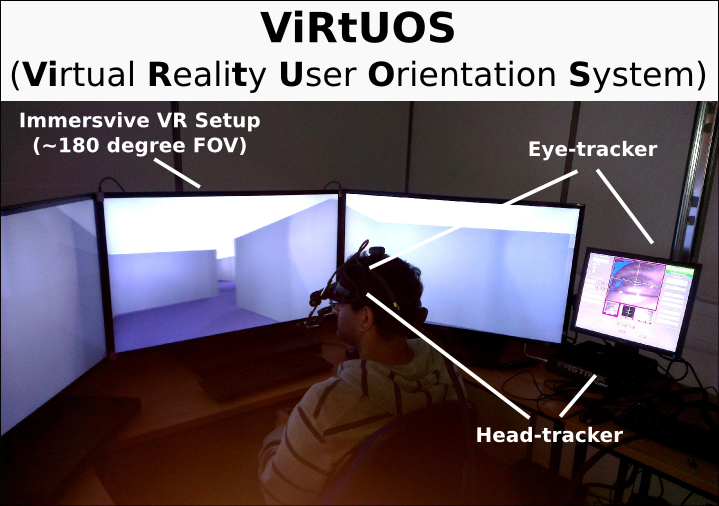Spatial disorientation is among the earliest indicators of dementia, an increasingly common condition in our ageing society that currently costs the UK £23 billion annually. With support of the Fusion-CCCP strand we have created ViRtUOS (Virtual Reality User Orientation System), a state-of-the-art eye-tracking and virtual environments research platform which will facilitate the study of factors that affect spatial disorientation in people with dementia. Data gathered using ViRtUOS will be used to formulate design principles for dementia-friendly care homes, reducing care costs, and leading to new knowledge with significance and reach.

To develop ViRtUOS we have brought together undergraduate RAs from Computing, Creative Technology and Computer Animation to work co-operatively and as part of a high-level, well-resourced multi-disciplinary team.
This video demonstrates the results of their excellent work:
CLICK HERE TO VIEW; http://www.youtube.com/watch?v=w1oo6JXWNuY
So far, this FIF project has been a great success and feedback from the students RAs suggests that they have enjoyed this unique student experience and that working in an inter-disciplinary team has helped them improve their skills.
Excerpts from students’ feedback:
“I enjoyed working on a project which is not exactly ordinary in my field, and working with people who come from different professional backgrounds. It was interesting to see how contrasting subjects tie into the same workflow to try and produce a coherent product. Personally, I am glad to take away new knowledge about my own study subject and the ones of my fellow colleagues; most of that knowledge I will surely apply in my last year of study.” Jurate Pozeraite (Computer Animation, Media School)
“I’ve learnt a lot in my time here, which will be invaluable for both my final year project and my future career. I’ve learnt not only about software development, but about modelling, developing reliable systems, working as a team to produce a joint system and error handling and bug fixing. I feel that working with other students, in a similar position to myself, really helped me in this project. They made me feel at ease and they helped me learn about their roles in developing this system, which otherwise I would have completely ignored. Overall I feel that for me personally this was a very worthwhile project, for expanding my experience and learning something new. I would love to continue my work with this project for as long as possible.” William Chappell (Computing, DEC)
“During the full length of the project I had learnt more and more, I think that this was the best opportunity I have had in a long time. This job gave me lots of experience with people from different schools, which have completely different perspectives. They are both brilliant in their profession and I have learned a lot from them. Also I hope they have learned some things from me. Generally, I have gained new skills including working with ‘Vizard 4.0’ software and ‘3DsMax’. In fact, the project was really interesting and I was glad to not only earn experience from it but also produce a good quality product at the end. Overall I am very happy that I get a chance to work with such a wonderful team. It was a great experience that improves my skills for future projects. If I had a chance to go back in time and redo this project again I will definitely do it.” Arkadiusz Szerszmidt (Creative Technology, DEC)
We believe that ViRtUOS has great potential to also foster other inter-disciplinary collaborations within BU and we would like to invite academics and students from across BU to get in contact with us, visit the laboratory and explore its potential for their research interests.
The further development of ViRtUOS will be driven by two PhD projects that started in October this year and we are planning to run first experiments investigating spatial orientation in people with dementia soon.

The team, from left to right: Arkadiusz Szerszmidt (undergraduate RA, Creative Technology), William Chappell (undergraduate RA Computing), Mary O’Malley (PhD student, Psychology & BUDI), Mariela Gaete-Reyes (BUDI), Jurate Pozeraite (undergraduate RA, Computer Animation), Chris Ramsey (PhD student, CDE), Jan Wiener (Psychology & BUDI)
CLICK HERE TO VIEW THE VIDEO !!!
By Mariela Gaete-Reyes & Jan Wiener











 SPROUT: From Sustainable Research to Sustainable Research Lives
SPROUT: From Sustainable Research to Sustainable Research Lives BRIAN upgrade and new look
BRIAN upgrade and new look Seeing the fruits of your labour in Bangladesh
Seeing the fruits of your labour in Bangladesh Exploring Embodied Research: Body Map Storytelling Workshop & Research Seminar
Exploring Embodied Research: Body Map Storytelling Workshop & Research Seminar Marking a Milestone: The Swash Channel Wreck Book Launch
Marking a Milestone: The Swash Channel Wreck Book Launch ECR Funding Open Call: Research Culture & Community Grant – Application Deadline Friday 12 December
ECR Funding Open Call: Research Culture & Community Grant – Application Deadline Friday 12 December MSCA Postdoctoral Fellowships 2025 Call
MSCA Postdoctoral Fellowships 2025 Call ERC Advanced Grant 2025 Webinar
ERC Advanced Grant 2025 Webinar Update on UKRO services
Update on UKRO services European research project exploring use of ‘virtual twins’ to better manage metabolic associated fatty liver disease
European research project exploring use of ‘virtual twins’ to better manage metabolic associated fatty liver disease